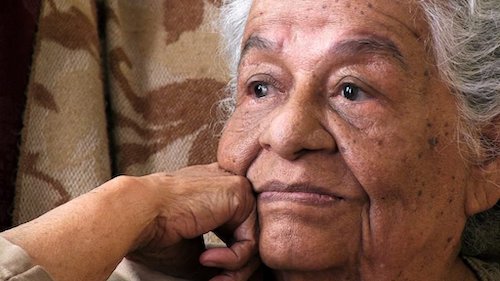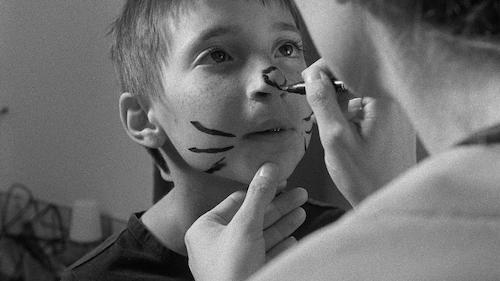Communiqué
Mama Icha never lost sight of her hometown of Mompox in “La Casa de Mama Icha” on POV – Oct. 18 at 10 pm
< < Back toPOV: La Casa de Mama Icha
Monday, October 18 at 10 pm
American Documentary | POV is pleased to announce the national broadcast premiere of La Casa de Mama Icha, the debut feature documentary from Colombian director and cinematographer Óscar Molina. Debuting as part of POV’s 34th season, the documentary will premiere Monday, October 18, 2021 on PBS at 10 p.m. ET and at pov.org. It will also be available to stream for free at pov.org through December 17, 2021. La Casa de Mama Icha is a co-presentation of POV and Latino Public Broadcasting.
An honorable mention at the Philadelphia Latino Film Festival and an official selection at the Cartagena International Film Festival, La Casa de Mama Icha offers a profound meditation on notions of home and the inescapable pull of one’s motherland. The documentary follows María Dionisia Navarro, otherwise known as Mama Icha, on a physical and spiritual journey that draws on the complexities inherent to many migrant experiences: distance, the loved ones left behind, and the problem of aging in a country that doesn’t feel like your own.
 At ninety-three, Mama Icha feels that the end of her life is near. Despite protestations from her family, she spends her days focusing on just one thing: returning to her native village of Mompox in northern Colombia. Mama Icha dreams of passing her final years taking comfort in the landscapes of her youth, walking along the Magdalena River at dusk, surrounded by her relatives and neighbors in the courtyard of the house that she painstakingly had built during her years of absence, with the money she sent from abroad.
At ninety-three, Mama Icha feels that the end of her life is near. Despite protestations from her family, she spends her days focusing on just one thing: returning to her native village of Mompox in northern Colombia. Mama Icha dreams of passing her final years taking comfort in the landscapes of her youth, walking along the Magdalena River at dusk, surrounded by her relatives and neighbors in the courtyard of the house that she painstakingly had built during her years of absence, with the money she sent from abroad.
Thirty years prior, Mama Icha had emigrated to the United States to help her daughter with the care of her children, Mama Icha’s grandchildren, and remained ever since. Now, against the best wishes of her family in the U.S. who feel that she’s built an admirable life in Philadelphia complete with Social Security, a community that supports her, and access to important senior resources, Mama Icha boards a plane and flies back to Colombia where she meets her sons, Gustavo and Alberto, who have been in charge of her house while she’s been gone.
But upon returning, the idyllic world of her memories is put up against a harsh reality of deteriorating family relationships and broken expectations. The confrontation is disappointing and forces Mama Icha to consider exactly how much she’s willing to sacrifice for the notion of home that she’s longed for so long.
“La Casa de Mama Icha is a declaration of love to one’s own land,” said director Óscar Molina. “In a time of great displacements, of fragmentation of the bonds of belongingness, of the preponderance of certain hegemonic cultural values, Mama Icha’s story reinforces the relevance of a sense of rootedness. She, heroically and with the strength of ancestral thought, faces great obstacles to meet the goal of living her last days and dying in the land of her origin.La casa de Mama Icha also mirrors family conflicts and how difficult they are, especially when elders start depending on the care of others. Altogether, this story invites us to think about the multiple meanings of the experience of ‘home’.”
 “This is a story of a woman’s dignity and unwillingness to negotiate her values and fulfill her last wish even if she has to leave a comfortable life behind. Mama Icha embodies the dream of many migrants who long to return home. As for many migrants, home is a complex experience and also the point of departure for most of the other experiences that shape our identity. Mama Icha is returning to a house built from a distance and with remittances sent back to Colombia from the United States due to the financial dependency of the income obtained in their host countries. Her story is also of a woman who, even in old age, plans to repair the family fabric that was damaged during her absence. Our invitation to viewers is always to see in Mama Icha’s story a mirror for our own relationships: towards ourselves, our families and our places of origin,” said producer Brenda Steinecke Soto.
“This is a story of a woman’s dignity and unwillingness to negotiate her values and fulfill her last wish even if she has to leave a comfortable life behind. Mama Icha embodies the dream of many migrants who long to return home. As for many migrants, home is a complex experience and also the point of departure for most of the other experiences that shape our identity. Mama Icha is returning to a house built from a distance and with remittances sent back to Colombia from the United States due to the financial dependency of the income obtained in their host countries. Her story is also of a woman who, even in old age, plans to repair the family fabric that was damaged during her absence. Our invitation to viewers is always to see in Mama Icha’s story a mirror for our own relationships: towards ourselves, our families and our places of origin,” said producer Brenda Steinecke Soto.
“In the lines of Mama Icha’s face we see the contours of a lifetime. A life of joy but also struggle, laid bare by the distance between the places she calls home and the efforts it takes to remain rooted in culture and family. This is a beautiful and loving family portrait that will touch any viewer. Don’t miss it!” said Chris White, Executive Producer of POV.
Shot with intimacy and proximity to its subjects, La Casa de Mama Icha is an observational documentary that portrays the heroic return of María Dionisia Navarro to Colombia after three long decades abroad. It is also an important reconfiguration of the standard immigrant narrative, reversing the direction and chronicling the cross-generational pain that often comes with years of family separation. At the same time, the documentary records the injustices that many elderly people face once they come to depend on others for their own care.
But perhaps more than anything, La Casa de Mama Icha points to the fact that sometimes the idea of “home” is more of a process of homecoming than the return to any one physical place. In this way, Mama Icha’s house becomes a symbol for her ultimate desire, to spend her final years with the knowledge that, in the end, she made her pilgrimage back to her place of origin.

